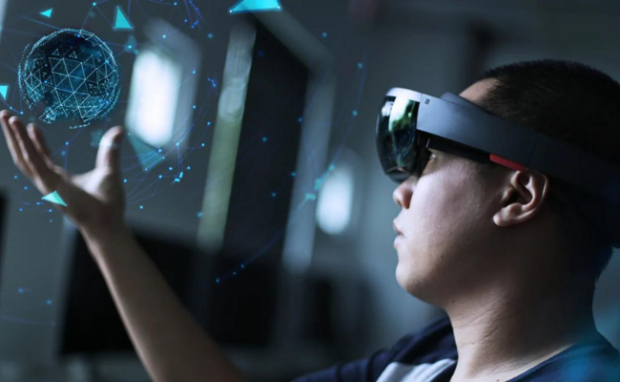ChatGPT Glasses Guide You Through Interviews And Dates
Do you need help passing your upcoming job interview? Perhaps you need a way to have more “rizz” (Gen Z term for “charisma”) for your next date? Then, try the ChatGPT glasses from Stanford student Bryan Hau-Ping Chiang. It uses rizzGPT, which Chiang described as a “real-time Charisma as a Service (CasS).”
The ChatGPT glasses merge GPT-4, OpenAI’s latest large language model, with AI voice recognition software Whisper and the Monocle AI glasses. As a result, the gadget looks like regular thick-rimmed glasses with a giant glass stuck on one of its lenses. It looks goofy but offers numerous possibilities for artificial intelligence and augmented reality.
I will explain how the ChatGPT glasses work and their potential real-world applications. Also, I will cover similar AI projects so that you can see how these technologies may change our lives. The ChatGPT glasses are an experiment, but other AI devices are more likely to come soon.
How do ChatGPT glasses work?
Computer science and electrical engineering student Bryan Hau-Ping Chiang created rizzGPT before creating ChatGPT glasses. It uses GPT-4 to start “a new era of ambient computing enabled by AR + AI, where everyone has their own personal assistant 24/7.”
As a result, he joked it will provide “real-time Charisma as a Service (CaaS).” Also, Chiang shared a video demonstration of the experimental gadget on Twitter.
It lets viewers see through the eyes of someone looking through the ChatGPT glasses. The video showed the monocle lens projecting ChatGPT answers.
It enables the user to read a recommended response during a job interview or date. More importantly, Chiang placed image recognition features in the gadget.
The ChatGPT glasses trained on his friend’s photos and smartphone messages. As a result, it immediately suggests statements once it detects Chiang’s friend.
excited to finally share how we built rizzGPT (and the code!)
we imagine a new era of ambient computing enabled by AR + AI, where everyone has their own personal assistant available 24/7.
it’s like having God observe your life and tell you exactly what to do next.
the deets 👇 https://t.co/QsbjmUeFZ9 pic.twitter.com/wo9Ldh5PyF
— bryan chiang (@bryanhpchiang) March 28, 2023
The Stanford student believed someone could deploy the eyewear during “awkward dates” so that the user could have an engaging conversation. Also, it can improve one’s dining experience.
Let us say you and your date can’t decide what to eat. The ChatGPT eyewear can analyze the menu you are looking at to suggest meals based on your dietary needs.
You may also like: ChatGPT Video Game Characters Seem To Have “Free Will”
However, Chiang understands its limitations. One glaring issue is the giant circular lens overlapping one of the lenses. You would look awkward wearing misshapen glasses during a job application or first date.
As a result, the rizzGPT glasses are more likely to give you “L rizz” (losing charisma) before the AI wingman activates. Moreover, the prototype needs numerous improvements.
It needs a longer battery life, lighter weight, smaller frame, and faster response time to become a useful consumer product. Still, Chiang and the other researchers remain optimistic, saying, “lots more to build here.”
Are there other AR projects in development?

Photo Credit: medicaldevice-network.com
The ChatGPT glasses may take months or years to launch publicly. However, other companies are more likely to release their AI gadgets soon.
For example, Google has been testing a new Google Lens feature to help people read illegible doctor’s notes. Google India says, “We announced today a state-of-the-art AI and machine learning model that can identify and even highlight medicines within handwritten prescriptions.”
Also, Chinese tech firm Xiaomi unveiled its AR Glass Discovery Edition at the Mobile World Congress on March 1, 2023. Its main feature lets users control physical devices and digital media with hand gestures.
You may also like: Elon Musk’s Dog Floki Is Twitter CEO
The Massachusetts Institute of Technology has also been busy adding new features to existing AR glasses. For example, MIT installed a new program to Microsoft Hololens 2 so that people can see through solid objects.
Augmented reality is also becoming a powerful medical tool. Dr. Safa Kassab, the chief of surgery at Trinity Health Oakland Hospital, has been using AR glasses to perform knee replacement surgery.
Conclusion
Stanford University students developed ChatGPT glasses that serve as AI guides. They say it will guide people through dates and job applications to achieve their goals.
The researchers admit their prototype is far from consumer-ready. However, we might see a functional version soon based on how fast technology progresses.
Do you want to learn more about artificial intelligence, ChatGPT, augmented reality, and other technologies? Follow Inquirer Tech for the latest digital trends.